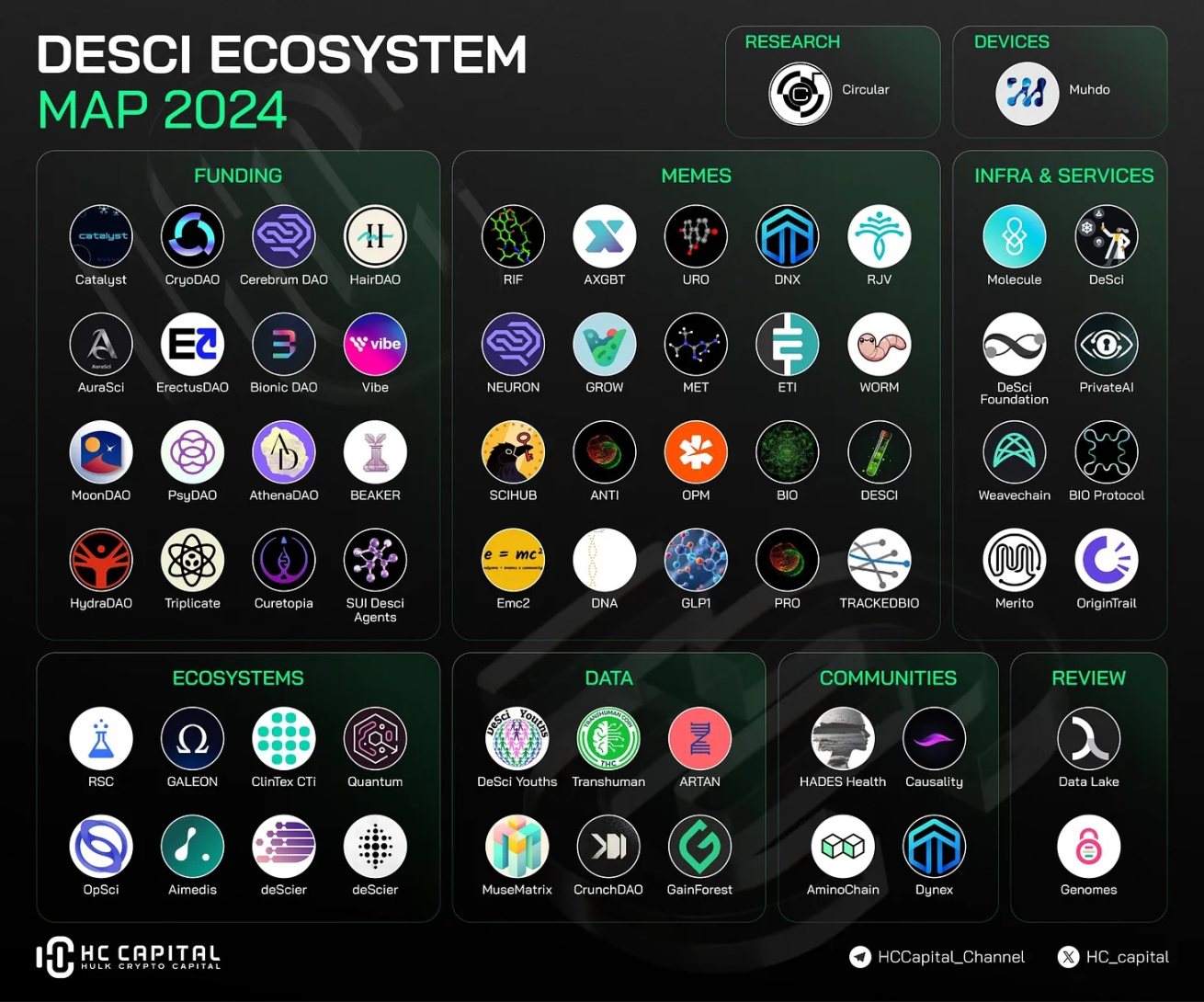DeSci (Decentralized Science) essentially applies the concept of cryptocurrency to the field of scientific research.
Written by: Thejaswini M A
Translated by: Saoirse, Foresight News
I have a friend who spent a full seven months writing a research grant application.
Seven months! That's longer than many people spend preparing for a wedding, and the pressure must have been immense. She is a talented cancer treatment researcher, yet she spent more time raising funds than actually doing research.
The entire system is completely upside down. Research requires funding, but to get funding, one must first prove that the research will succeed—yet how can one prove it will succeed without doing the research?

In contrast, some things are simply absurd: a YouTube blogger launched a crowdfunding campaign for "counting grains of rice" and raised $100,000 in just one weekend. The irony is striking.
Today, in the crypto space, a movement called DeSci (Decentralized Science) is emerging, attempting to revolutionize the research funding model using cryptocurrency and blockchain technology.
Don't dismiss it too quickly; you might change your mind after hearing more—this approach might actually work.
How bad is the current system?
The traditional research funding process works like this: researchers write detailed research proposals, submit them to government agencies or companies, and then wait 6 to 18 months for a response. Most applications are rejected, and even if approved, they come with a host of restrictions, leading researchers to spend more time on paperwork than on actual research.
The core of this process is "risk reduction," which sounds reasonable, but the problem is that groundbreaking discoveries are inherently risky. From antibiotics to the internet, the most significant scientific breakthroughs were often in "niche areas" that review committees would initially refuse to fund.
There’s also the issue of publishing papers: researchers must publish their results in expensive academic journals, which charge exorbitant fees and put research findings behind paywalls. The result is that research funded by taxpayers is inaccessible to the taxpayers themselves.
Ultimately, excellent researchers waste years in bureaucratic processes instead of solving real problems. Important research is delayed or even stillborn, while the public, which largely funds basic research through taxes, is kept out of the scientific results they paid for.
Enter DeSci
DeSci (Decentralized Science) essentially applies the concept of cryptocurrency to the field of scientific research: researchers no longer have to "beg" for funds from review committees but can directly crowdfund from those interested in their research; research results are no longer locked behind paywalls but stored on public blockchains, accessible to anyone.
When Ethereum co-founder Vitalik Buterin and former Binance CEO Changpeng Zhao began discussing this concept publicly, DeSci gained widespread attention. It’s important to note that when big names in the crypto space focus on something, it often means the necessary infrastructure is ready to be implemented.
The specific operational model is as follows: researchers issue tokens representing their projects, and people fund the research by purchasing these tokens. If the research succeeds and generates profitable results, token holders can share in the profits.
This is no longer a theoretical fantasy; many companies are building tangible infrastructure for decentralized science.
Take BIO Protocol, a key player in this field, for example. It has received support from Binance Labs and has substantial financial backing. BIO has created what it calls "BioDAOs," which are essentially investment communities for crowdfunding biotechnology research. It’s no longer a few wealthy individuals deciding which cancer therapies are worth developing; instead, thousands of people can pool their funds and vote on research directions.
There are also Molecule and VitaDAO, which focus on longevity research and tokenize intellectual property: when researchers achieve certain results, ownership is distributed among all funders. Currently, they support projects including aging research at Newcastle University and longevity research at the University of Copenhagen.
The scale of funding is also continuously growing. These platforms have processed millions of dollars in research funding, with some individual projects raising hundreds of thousands of dollars through token sales. Although still small compared to traditional funding, the growth rate is astonishing.

The more I think about DeSci, the more I feel its significance is profound. Scientific research is inherently a collaborative process; researchers build on previous work, share data, and peer review, and blockchain technology is precisely designed for this kind of transparent collaboration.
The traditional funding system has created distorted incentive mechanisms: researchers, in order to secure funding, must exaggerate the certainty of their research, which hinders exploration in "uncertain but potentially groundbreaking" directions. DeSci reverses this. It rewards researchers for sharing all data, including failed experiments, as these may help others avoid pitfalls.
Another benefit is that it allows researchers from around the world to participate. A researcher in Nigeria with a good idea can raise funds globally without relying on Western universities or funding agencies. This has significant implications for the democratization of scientific progress.
Moreover, transparency is inherent: when research is funded through blockchain tokens, everyone can clearly see where the funds are going, eliminating the need to guess whether the funding is being used for actual research or has turned into administrative expenses.
Risks and Challenges
Of course, risks cannot be ignored. The biggest issue is quality control. Traditional peer review, despite its flaws, can filter out some poor-quality research. In a decentralized system, how can we prevent people from funding obviously unreliable research projects?
Volatility is also a real challenge. If a five-year cancer research project is funded through crypto tokens, what happens if the token price plummets by 90%? Long-term research requires stable funding support.
Regulatory uncertainty also exists. Most countries have complex regulations regarding medical research, drug development, and intellectual property, and how tokenized research fits into existing legal frameworks is still unclear.
To be honest, most scientists are not "natives" of the crypto space, and asking them to suddenly become experts in token economics and DAO governance is quite a tall order.
Conclusion
Despite the many issues, the momentum of DeSci's development cannot be ignored. The relevant infrastructure is becoming increasingly robust, funding is on the rise, while the traditional research funding system is deteriorating. When funding agencies take 18 months to approve emergency research funding, while crypto crowdfunding can be completed in just a few days, the efficiency gap is evident.
Early projects are mostly concentrated in the fields of biotechnology and longevity research, which makes sense as these areas have clear commercial potential: if the funded research leads to a new drug, token holders can share in the profits. However, this model is actually applicable to any research that can ultimately create value.
I believe we are at the early stages of a significant endeavor. It’s not that cryptocurrency will overnight replace traditional research funding, but it offers a faster, more transparent path that allows global researchers to access funding more easily.
The true test of DeSci will be whether it can produce actual scientific breakthroughs, not just raise money. But given the current state of traditional research funding, trying new methods is certainly worthwhile.
This is just the beginning. The DeSci field is developing rapidly, with new projects emerging continuously, and real money is flowing into actual research. The intersection of cryptocurrency and research funding is giving rise to opportunities that did not exist a year ago.
免责声明:本文章仅代表作者个人观点,不代表本平台的立场和观点。本文章仅供信息分享,不构成对任何人的任何投资建议。用户与作者之间的任何争议,与本平台无关。如网页中刊载的文章或图片涉及侵权,请提供相关的权利证明和身份证明发送邮件到support@aicoin.com,本平台相关工作人员将会进行核查。




